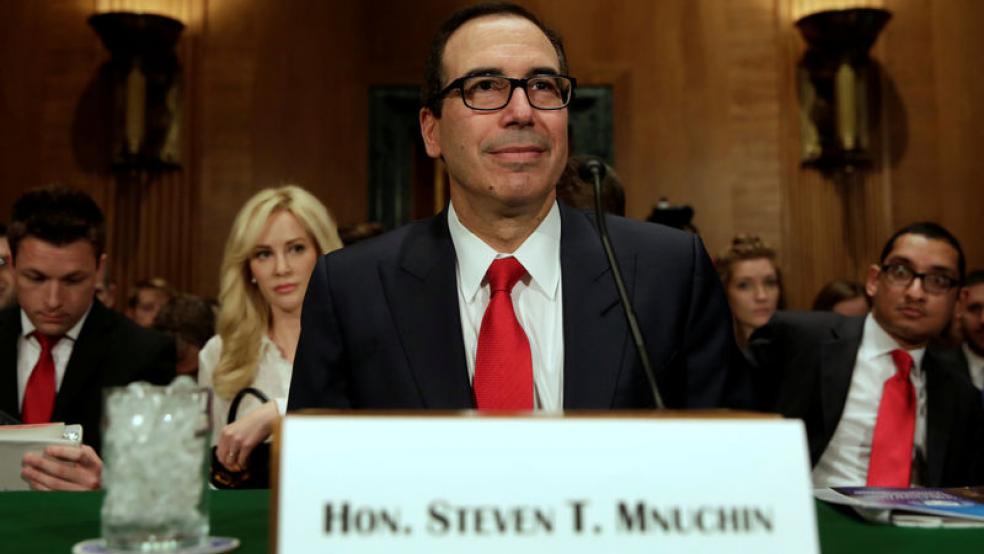Republicans in Congress seem resigned to the prospect of having to force all of their legislative hopes and dreams for the 115th Congress through the narrow window of a pair of budget reconciliation provisions, one modifying the spending plan for Fiscal 2017 and one for 2018. So they are increasingly bringing up an idea that would allow them to do more within that constraint: expanding the “budget window” from 10 years to 20.
And on Tuesday, Treasury Secretary Steven Mnuchin signaled that the Trump administration would be willing to work with congressional Republicans to make that happen.
Related: Trump Gets a Reprieve on Raising the Debt Ceiling
The traditional 10-year budget window seeks to strike a balance between the recognition that government actions have consequences that extend beyond their immediate impact and the fact that the further out into the future we try to predict those consequences, the worse we get at it.
The budget window is particularly important to legislation passed through the Senate’s reconciliation process, because under the body’s standing rules, no measure that is expected to increase the nation’s deficit outside the budget window can be included in a reconciliation bill.
This has hobbled Republicans before in efforts to cut taxes. Measures passed at the beginning of George W. Bush’s first term in office were required to “sunset” in the early years of Barack Obama’s presidency to avoid violating the deficit requirement, which is known as the Byrd rule.
So, it was in the context of tax reform proposals that Pennsylvania Sen. Pat Toomey raised the issue of a debt window expansion with Mnuchin on Tuesday, during a Senate Budget Committee hearing.
Related: Trump Treasury Could Defang a Major Consumer Financial Watchdog
“The goal should be to maximize growth, and get the right tax code, not to be held captive by this score that may not take into account that full growth,” Toomey said.
Toomey took for granted the idea that there would be no bipartisan cooperation on tax reform, and expressed frustration that reconciliation was the only way forward.
“So you’re in this bind, where you’re stuck with a temporary tax code -- one that has to expire at the end of the budget window,” he complained. “So I would just like to suggest that you seriously consider an additional 10 years.”
He pointed out that there is no statutory requirement that the budget window be 10 years, and argued that in the absence of tax reform that can be passed outside the reconciliation process, “the next best thing is a temporary great tax code but making it long enough that we can actually enjoy the benefits.”
Related: Why a Soaring Stock Market Makes Tax Reform Harder
Mnuchin said that the Trump administration still hopes to get bipartisan support for permanent tax reform. However, he added, “If we can’t, reconciliation is an alternative and I look forward to working with you and the senate on ideas such as a 20-year window as opposed to a 10-year window.”
It’s a plan that makes budget hawks a little bit nervous. While there are arguments for extending the window -- such as tax provisions that really are expected to have a positive effect on the deficit, but only after more than 10 years have gone by -- it’s not obvious that anything like that is really on the table right now.
“If the purpose of extending the budget window is because you have a tax plan or spending plan that’s effects really start to appear outside the 10 years, I’m very sympathetic to it,” said Marc Goldwein, senior vice president and senior policy director at the Committee for a Responsible Federal Budget.
“But if the purpose of extending the budget window is so that you can manipulate the Byrd rule and make it so that you have a ‘temporary’ tax cut or ‘temporary’ deficit spending that goes for 19 years before it expires, that’s just ridiculous. It’s a pure gimmick and there’s no basis for that except to circumvent important senate rules.”
It’s an open question as to which category any eventual tax reform proposal that clears the Senate will fall into, but Goldwein said that in his view, the tax proposals being floated right now are more likely in the latter category.





